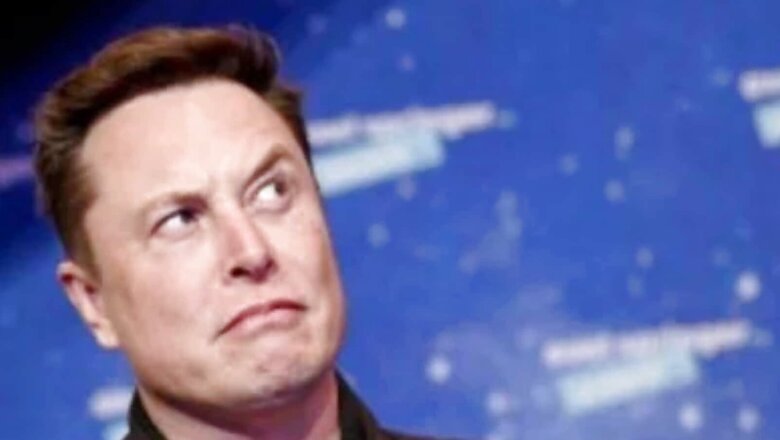
views
Elon Musk has a habit of tilting at windmills so it is no surprise that he believes the “woke mind virus” is making Netflix unwatchable. In the last three months, the streaming platform has lost 200,000 subscribers, the first drop in over a decade. It has meant a decline of 35 per cent in the company’s share value.
The woke mind virus is making Netflix unwatchable— Elon Musk (@elonmusk) April 20, 2022
He is just one of several Rich White Males (and few can be whiter than the son of a white South African father and Canadian mother) who have been mansplaining about Hollywood and ascribing its decline to the rise of wokeness, which for those who don’t know means being aware of social issues such as gender inequality, racism, absence of LGBTQIA representation, among other things. Identity politics is killing the entertainment industry is a complaint one has heard from filmmakers, from Quentin Tarantino in America to Karan Johar in India.
In an interview to Bill Maher last year, a man completely tone deaf to anything but right-wing politics, Tarantino said: “Ideology has become more important than art. It’s like ideology trumps art. Ideology trumps individual effort. Ideology trumps good.” At a recent conference, Johar echoed his worldview, explaining the decline of Bollywood and the rise of southern cinema: “We changed our syntax after 2001 and took a different path whereas Telugu cinema specifically held on to its heroism in storytelling made by directors who knew what they were chasing.”
Also Read: Elon Musk is Right About ‘Woke Mind Virus’. The Left Co-Opted and Corrupted Wokeness
But do we really want a return to the narratives of the past? When screens were full of white people, writer rooms had only men, big stars like Rock Hudson had to suppress their sexuality in order to become leading men, women like Merle Oberon had to erase their Anglo-Indian identity to be accepted by Hollywood, and donning blackface to play people of colour on screen like Robert Downey Jr. in Tropic Thunder (2008) was considered funny.
In India, we’ve seen the emergence of righting these wrongs as well, with the stalker romances of the ‘90s being decried for their warped idea of consent and the early movies of 2000s like Kal Ho Naa Ho (2003) and Dostana (2008) being scrutinised closely for their laughable representation of the LGBTQIA community. Even more recent movies such as Atrangi Re and Chandigarh Kare Aashiqui have been questioned for their depiction of mental illness and transgenders respectively, for either misrepresentation or not going far enough.
The rise of streaming services has changed the idea of diversity and inclusion, with global players such as Netflix and Amazon Prime Video challenging the status quo of Hollywood studios. They have ensured writers’ rooms globally have greater representation of identities. It doesn’t succeed everywhere.
In India, for instance, certain film industries such as Marathi and Tamil have historically been more sensitive to representation of caste, but the Hindi film industry has fallen into a troubling political trough where certain nationalistic narratives are being given precedence at the cost of whipping up a kind of Islamophobia. Wokeness in Indian entertainment stops at the door of Hindu nationalism, as one saw in the outcry against movies such as Sanjay Leela Bhansali’s Padmaavat (2018) and series such as Amazon Prime Video’s Tandav (2021).
In Hollywood, though, the outcry by Rich White Males against the “woke virus” has become endemic. A series of articles, most prominently on Bari Weiss’ Substack, written by Peter Kiefer and Peter Savodnik, have quoted unnamed sources speaking against the trend which is being tracked back to the #OscarsSoWhite movement that began in 2015 when there was not a single black nominee in the awards given by the Academy of Motion Picture Arts and Sciences. The #MeToo movement in 2017 and the 2020 conviction of the once-powerful mogul Harvey Weinstein for sexual harassment added to the momentum of reform. The killing of George Floyd in 2020 meant that Hollywood’s diversity had to extend beyond tokenism.
So, in September 2020, the Academy started its Representation and Inclusion Standards Entry platform (or RAISE). By 2024, no film will be considered for best picture without meeting two of the four standards for the representation of ‘underrepresented groups’, which include women, people of colour, LGBTQ people, and people with disabilities.
These initiatives are supported by an institution known as ARRAY Crew, run by filmmaker Ava DuVernay. It’s a database of women and BIPOC (black, indigenous, and people of colour) film professionals (camera operators, art directors, make-up artists, sound producers) as approved employee choice list for producers.
Is it any surprise then that the Best Picture winner this year was CODA on the life of a girl raised in a hearing-impaired family, played by actors from that community. Or, that the Best Actor went to a Black man, only the fifth in history. Or, that the Best Supporting Actress was won by a queer Afro-Latina for playing a Latina in West Side Story and the Best Supporting Actor was snagged by a hearing-impaired person for playing a hearing-impaired person. The Best Director was a woman, Jane Campion, only the third in history to win that award, for subverting the ultimate Hollywood symbol of masculinity, the Western, in her acclaimed The Power of the Dog.
How much of this wokeness is because of artistic reasons or commercial compulsions — given that half of Hollywood’s box office revenue now comes from outside America and that streaming services have global footprints — is not clear.
But then Musk himself is a curious mixture of conventional chauvinism and liberal wokeness. When it comes to issues that directly affect his business, such as climate change, he is at the forefront of change. In other areas, other people’s liberalism gets trolled for its “wokeness”, just as old fashioned fairy tales are now seen for what they are, nothing less than modern-day horror stories. After all, one man’s wokeness is another man’s thought police.
The author is a senior journalist and former editor of India Today magazine. The views expressed in this article are those of the author and do not represent the stand of this publication.
Read all the Latest Opinions here




















Comments
0 comment